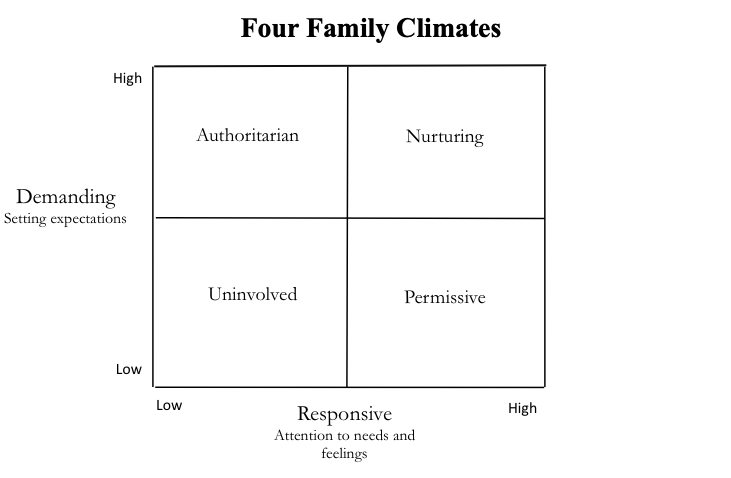Family Climate
Episode #1 of the course Parenting skills to raise responsible, mature children by Roger K. Allen, PhD
Welcome to Lesson 1 of “Parenting Skills to Raise Responsible, Mature Children.” I’m Roger K. Allen, PhD, an author, consultant, coach, teacher, and expert in leadership and personal and family development. I’ve certified over 1,200 coaches and consultants from around the world to use my products and methods that have benefited hundreds of thousands of people.
In this lesson, I’m going to help you step back and look at your parenting style so you can become more deliberate about creating a positive climate in which to raise your children.
In the 1960s, Diana Baumrind proposed three types of parenting (Authoritarian, Permissive, and Authoritative). Maccoby and Martin built upon Baumrind’s typology in the 1980s by making explicit two critical dimensions of parenting, which results in four family climates:

I’m going to describe three of the climates. I won’t talk about the uninvolved climate because it is less common among parents who care enough to study parenting.
Permissive Climate
Permissive families are lax. Although warm and responsive, these parents don’t impose many expectations, structure, or routine on their children. The children experience greater freedom and independence, such as getting their own meals, playing in the mud, or staying out late.
Some parents are permissive because they dislike imposing control. They believe in individuality and allowing their children “say.” Many are permissive because they are unsure of their own authority. They have trouble setting boundaries or limits.
Either way, these parents want their children to be happy and so avoid conflict and indulge them materially or emotionally. Consequently, the children have a lot of power and control. They tend to become demanding and learn to get what they want through tears, tantrums, whining, and accusations. The parents give in to keep the peace, which only reinforces their children for acting in self-centered and demanding ways.
These children may grow up to be independent but also entitled and not as good at emotional self-regulation. They often haven’t learned to do hard things and so lack the discipline to stick with difficult tasks. In general, they are less likely to work hard and achieve in school or life.
An Authoritarian Climate
This climate includes a great deal of structure and rules. The parents are in charge, and children know what is expected of them. There are consequences (or punishment) if the children violate their parents’ expectations.
Generally, authoritarian parents lack sensitivity to what their children think and feel. They are insecure about their children’s ability to perform or make good choices, so they either over -control by putting many rules in place or “ride herd” over them to make sure they are doing what they’re “supposed” to do.
In short, these parents over-manage their children. The kids wait until they are prompted to take any kind of action. In the long run, they tend to become compliant and obedient (good child) or rebellious and defiant (bad child). Unless they outright rebel, children from these families like to please and are usually well-behaved. However, they are more likely to have poor social skills and suffer from depression, anxiety, or low self-esteem.
A Nurturing Climate
This culture includes both structure and responsiveness. These parents trust their own authority and use it to create a positive environment rather than over-control their children. They set age-appropriate limits but also allow their children to assume responsibility by making decisions and solving problems.
Family structure comes from principles and family values rather than an attempt to control the children. Rather than getting into power struggles, these parents allow consequences (natural and imposed) to operate and shape their children’s behavior.
The parents also feel and communicate lots of love and respect. They spend time with their kids, joining them in their world when young and taking time to talk and listen to them as they get older. They make positive assumptions about their children’s motives and capability, allowing them to respond in a soft way, even during moments of disagreement.
These children generally grow up feeling good about themselves. They show self-responsibility and are most likely to thrive in school and life.
Summary
The purpose of this lesson has been to introduce you to four family climates to help you find a good balance between demands and responsiveness. So, now take a moment: How would you characterize the home in which you grew up? What about the climate in your family today?
In the next lesson, I’m going to lay out how we over-control and over-manage our children. Then in upcoming lessons, I’ll present skills to communicate in ways that build a nurturing family climate.
Recommended reading
Four Parenting Styles: Characteristics and Effects
Recommended book
Share with friends

